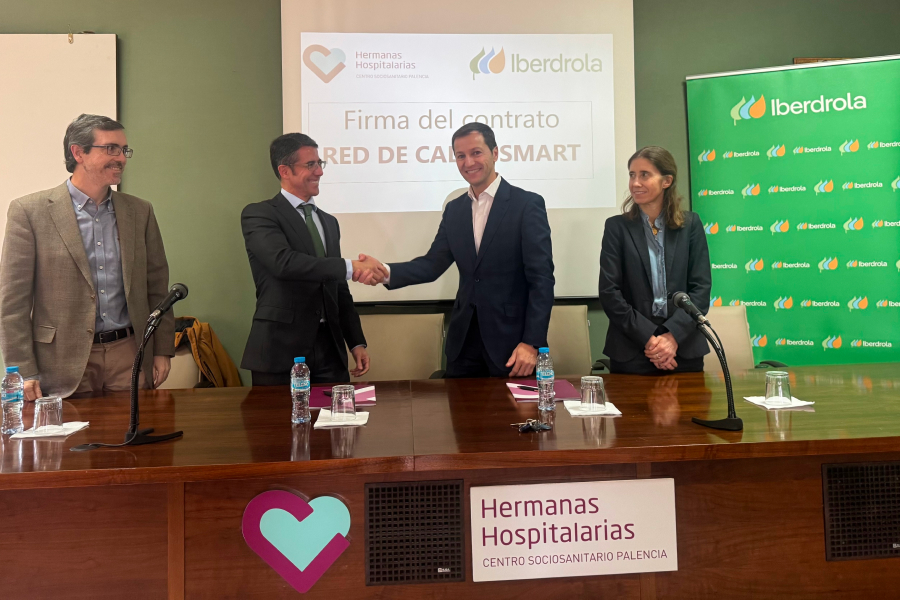Hermanas Hospitalarias 'hooks up' to Iberdrola España's renewable district heating grid in Palencia
- The centre, which will be this heating grid’s first customer, is making progress in its commitment to promote sustainability and contribute to the fight against climate change
- A much cleaner, safer and more efficient alternative to gas and diesel with no investment needed at any site, which will only pay for the energy they consume
- It also cuts back on the energy bill by guaranteeing price stability


The Hermanas Hospitalarias centre in Palencia will be the first customer to be connected to the renewable heating grid that Iberdrola España is promoting in this city. This is progress in its commitment to promoting sustainability and contributing to the fight against climate change through decarbonisation and electrification after having already connected to solar energy in the summer of 2023 by installing a self-consumption photovoltaic plant.
The managing director of Hermanas Hospitalarias Palencia, Javier Arellano, and the sales director of Iberdrola España in Castilla y León, Celiano García, signed an agreement this morning by which the facilities of the social and healthcare centre in the capital of Palencia will receive hot water and heating from a much cleaner, safer and more efficient source than those generated with gas or diesel. There will be no investment on the part of its centres, which will only pay for the energy they consume.
In addition to saving on its energy bill, as price stability is guaranteed, the Palencia social and healthcare centre and residence will have efficient and sustainable heat, moving towards the reduction of fossil fuels and energy efficiency when this Iberdrola España initiative is implemented, the first of an ambitious portfolio of projects that the company is developing in Spain.
"This project will serve to accelerate the decarbonisation of heating and domestic hot water (DHW) services, helping clean our air and lower energy bills that are not subject to fluctuations in the prices of fossil fuels internationally", emphasises Celiano García, sales director of Iberdrola España in Castilla y León.
Javier Arellano, Managing Director of Hermanas Hospitalarias Palencia, pointed out that "this decision is part of the centre's Social Responsibility policy, in which care for the environment and sustainability in the modernisation of our facilities that the centre has been carrying out in recent years are essential issues".
In addition to the advantages for these types of care centres, which will have smart control of the buildings' energy, improving their energy rating, and will have a simpler hot water and heating system, which will improve reliability over traditional systems, the environment will also benefit, as surplus energy will be used to produce heat, improving efficiency and the local economy and reducing CO2 emissions and pollution.
A renewable heating grid that is making good progress
Iberdrola España, which reaffirms its commitment to decarbonisation, will invest close to €40 M in deploying this renewable heating grid, which is progressing at a good pace to supply heating and hot water to condos and apartment buildings, companies and government buildings.
This heating grid, which has a fifty-year concession from Palencia City Council, will be executed over the next three years and will run through the districts of Pan y Guindas, Centro, Allende del Río, El Carmen, San Juanillo, Avenida de Madrid, San Pablo y Santa Marina, San Antonio, Santiago, Ave María and El Cristo, among others.
This project’s implementation will prevent the emission of approximately 20,000 tonnes of CO2 a year.
The company has the support of the Ministry for the Environmental Transition and the Demographic Challenge, as the initiative has been selected to receive a grant of €4.9 M from the Incentive Programme for heating and cooling grid projects using renewable energy sources in competitive competition, within the framework of the EU-financed Recovery, Transformation and Resilience Plan, NextGenerationEU. A heating grid to warm more than 5,000 homes Heating grids are powered by the renewable energy around them such as industrial waste heat, heat pumps, geothermal, solar, biomass and any type of energy available to supply hot water and heating to a residential complex or a city while reducing emissions and with them pollution.
The heat travels from a central plant in the form of hot water through a system of buried pipes to a substation that organises the transfer of energy to the internal circuit of the buildings. This is a business with promising growth opportunities in Spain.
This first district heating in Palencia will have a 100% renewably-sourced generation plant and will supply more than 5,000 homes through this approximately 20 kilometre-long piping system that will make up the input/output grid of the centralised installation that will connect the plant with the buildings and industries involved. The heating grid will also have a 10,000 m3 thermal storage tank that will allow decoupling production from heat demand.
